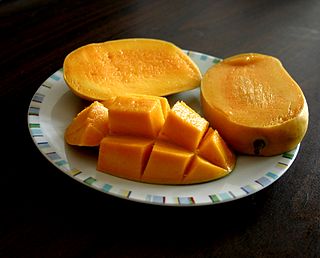Related Research Articles

Three European Union schemes of geographical indications and traditional specialties, known as protected designation of origin (PDO), protected geographical indication (PGI), and traditional specialities guaranteed (TSG), promote and protect names of agricultural products and foodstuffs. Products registered under one of the three schemes may be marked with the logo for that scheme to help identify those products. The schemes are based on the legal framework provided by the EU Regulation No 1151/2012 of the European Parliament and of the Council of 21 November 2012 on quality schemes for agricultural products and foodstuffs. This regulation applies within the EU as well as in Northern Ireland. Protection of the registered products is gradually expanded internationally via bilateral agreements between the EU and non-EU countries. It ensures that only products genuinely originating in that region are allowed to be identified as such in commerce. The legislation first came into force in 1992. The purpose of the law is to protect the reputation of the regional foods, promote rural and agricultural activity, help producers obtain a premium price for their authentic products, and eliminate the unfair competition and misleading of consumers by non-genuine products, which may be of inferior quality or of different flavour. Critics argue that many of the names, sought for protection by the EU, have become commonplace in trade and should not be protected.

A geographical indication (GI) is a name or sign used on products which corresponds to a specific geographical location or origin. The use of a geographical indication, as an indication of the product's source, is intended as a certification that the product possesses certain qualities, is made according to traditional methods, or enjoys a good reputation due to its geographical origin.

Vazhakulam is a village in Muvattupuzha Talukis in Ernakulam district in the Indian state of Kerala. This town is known as Pineapple City due to its large-scale pineapple farms.

The Kinnow is a high yield mandarin hybrid cultivated extensively in the wider Punjab region of India and Pakistan.

Arakuzha is a small village situated 6 km from Muvattupuzha in Kerala, India. The SH 41 connects Arakuzha with Muvattupuzha and Koothattukulam and Moozhi bridge connects Arakuzha to pineapple city of India, Vazhakulam town which is also 6 km from Arakuzha. It is located on SH 41 towards Koothattukulam, the alternate route for Main Central Road. St. Mary's High School and St. Joseph’s girls' school are the oldest high school in Arakuzha. Arakuzha is also home to two Christian pilgrim centres-St. Mary’s Forane Church and Malekurish Church. The chief festival is on the first Sunday after Easter.
Kallorkkad is a village in Ernakulam district, in the Indian state of Kerala. Most of its people are either farmers or engaged in small-scale business.

Varappetty is a village in Ernakulam district in the Indian state of Kerala. Varappetty is 7 km from Kothamangalam along Kothamangalam-Vazhakulam Road, 6 km from Muvattupuzha along Puthuppady-Oonnukal Road and 12 km from Vazhakulam in Eranakulam District.
Kuttiattoor is a census town in Taliparamba taluk of Kannur district in the Indian state of Kerala. Kuttiattoor is located 26 km (16 mi) north east of District headquarters Kannur and 6.5 km (4.0 mi) south east of Mayyil.
Anikkad is a village in Ernakulam district in the state of Kerala, India. It is located near the Muvattupuzha town in Avoly Panchayat.
The country of Georgia is the first among the EU neighbourhood countries to take an important step towards protecting its local food and beverages from being copied in other countries. The country has a rich history of local and specialist agricultural production and has long been famed for its wines. Names of as many as 18 premium quality local wines have been protected by the use of appellation system, the appellations usually being the geographical name of the area in which the wine is produced.
The Geographical Indications of Goods Act, 1999 is a sui generis Act of the Parliament of India for protection of geographical indications in India. India, as a member of the World Trade Organization (WTO), enacted the Act to comply with the Agreement on Trade-Related Aspects of Intellectual Property Rights. The GI tag ensures that only those registered as authorised users are allowed to use the popular product name. Darjeeling tea became the first GI tagged product in India, in 2004–05, since then 370 goods had been added to the list as of August 2020.

Mahabaleshwar strawberry is a strawberry grown in the hilly slopes of Mahabaleshwar, which accounts for about 85 percent of the total strawberry produced in India. Strawberry, along with raspberry, mulberry and gooseberry, is produced on a large scale in and around Mahabaleshwar. Mahabaleshwar strawberry obtained the geographical indication (GI) tag in 2010.
Kuthampally dhoties and set mundu are dhoties and set mundus manufactured by the weavers in the Kuthampally region in Kerala, India. This clothing product has been registered under Sub-section (1) of Section 13 of the Geographical Indications of Goods Act, 1999 with effect from 13 November 2015. The registration was recorded as per an application made by Kuthampully Handlom Cluster Charitable Society Consortium.

The 'Gir Kesar' mango, also called Kesar, is a mango cultivar grown in the foothills of Girnar in Gujarat, western India. The mango is known for its bright orange colored pulp and was given the geographical indication status in 2011. The biggest market of Gir Kesar is in Talala Gir known as a Mango Market Yard.

Brass broidered coconut shell craft of Kerala is the craft of making beautifully carved and brass broidered products like cups, flower vases, snuff boxes, nut bowls, powder boxes and spoons using coconut shells as practiced by the artisans of Kerala in India. This art requires great skill on the part of the artisan as the shell is extremely hard. The main centres of production in Kerala are located in Thiruvananthapuram and Kozhikode Districts. Though the coconut shell craft is also prevalent in Goa, Tamil Nadu, Pondicherry, Andaman and Nicobar Islands and West Bengal, the brass broidered variety is practiced only in Kerala.
Malabar pepper is a variety of black pepper that originated as a chance seedling in a geographical region that now forms part of the present-day state of Kerala in India. The area of production of this variety of pepper now covers all the regions that are part of the Malabar Coast. Malabar pepper was one of the commodities most sought after by the ancient Roman and Arab traders, and later by the early European navigators.
Sabarimala Railway is a proposed 111 kilometres (69 mi) railway line from Angamaly to Erumeli, near Sabarimala that was sanctioned in 1998 by Indian Railways. According to a memorandum of understanding signed between the Kerala State and the Ministry of Railways on 27 January 2016, commercially viable railway projects will be identified and handed over to the Special Purpose Vehicle (SPV) to be fast-tracked on a 51:49 per cent equity basis. The SPV has discussed the extension to Punalur. The currently proposed Sabarimala railway is under PMO - Proactive government and timely implementation (Pragati); will be monitored by the Prime Minister's Office. The proposed railway line will be a great relief to the transportation problems faced by Idukki, Kottayam, and Pathanamthitta districts. Railways have agreed to start the project once the Kerala Rail Development Corporation gives the revised estimate for the project.

Gandhakasala rice is a variety of rice cultivated by the farmers in Wayanad District in Kerala. This is a scented variety of rice grown mostly by the members of the tribal communities of in Panamaram, Sultan Bathery, and Mananthavady areas in Wayanad. As of 2010, gandhkasala is cultivated in an area of 327 hectares and jeerakasala in 22 hectares.
Geographical Indications in Cambodia are a form of intellectual property consisting of an "which is a name or represents a geographical origin and identifies the goods as originating in such geographical area where a given quality, reputation or other characteristic of the goods is essentially attributable to its geographical origin;". Geographical indications can be registered based on the Law on Geographical Indications Registration is open for agricultural goods and foodstuffs, but also for handicraft goods
References
- ↑ "Geographic Indication Vazhakulam Pineapple". Pineapple Research Station, Vazahakulam. Retrieved 27 January 2016.